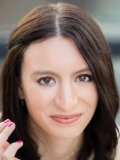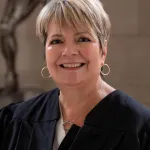Your trusted source for contextualizing politics news. Subscribe to our daily newsletter.
The two candidates in a pivotal race for Wisconsin Supreme Court sparred on abortion access and judicial independence in their only one-on-one debate, held Tuesday afternoon.
The election between liberal Janet Protasiewicz and conservative Dan Kelly will decide the balance of the court and likely the fate of abortion in the state, where it has been inaccessible since the Supreme Court overturned Roe v. Wade in June.
Both candidates singled out their opponent’s support from outside abortion-focused groups as evidence their decisions in a lawsuit over the state’s 1849 abortion ban, which is likely to end up in the high court, would be predetermined and based on politics as opposed to the law. Protasiewicz has emphasized her support for abortion rights in her campaign messaging and attacked Kelly as extreme on the issue, highlighting his ties with Wisconsin’s anti-abortion groups.
“I’ve been very clear about my values to the electorate because I think the electorate deserves to know what a person’s values are, rather than hiding them,” Protasiewicz said in the debate. “I’ve also been very clear that my decision that I render will be made based solely on the law and the constitution.”
While Kelly has criticized abortion in earlier writings, he has not taken a clear position on its legality in this campaign. Throughout the debate, Kelly accused Protasiewicz of telling “sloppy,” “irresponsible” and “defamatory” lies about his positions and the nature of his support from anti-abortion groups. Protasaciewcz, meanwhile, derided Kelly as “one of the most extreme partisan characters in the history of the state.”
The debate, hosted in Madison by the State Bar of Wisconsin in collaboration with WISC-TV and WisPolitics.com, came on the first day of early voting in the race to replace retiring conservative Justice Patience Roggensack. Election Day is April 4.
The race, which has already broken a record for the most expensive judicial race in U.S. history, has attracted high amounts of outside spending, including by groups focused on abortion. The tenor of the debate reflected both the immense stakes — and the increasingly high levels of partisan rancor — in the technically nonpartisan race for Wisconsin’s Supreme Court.
The political arm of Planned Parenthood Affiliates of Wisconsin has spent over $150,000 in independent expenditures supporting Protasiewicz and opposing Kelly in March so far, according to campaign finance filings. Protasiewicz has also been backed by Emily’s List, the group’s first-ever endorsement in a judicial race. In the debate, she said she “wasn’t aware” of any direct contributions made to her campaign by either group.
“But if I can tell you my opponent is elected, I can tell you with 100 percent certainty that the 1849 abortion ban will stay on the books,” she added.
Kelly has been endorsed by Susan B. Anthony Pro-Life America, a major national anti-abortion group, as well as Wisconsin Right to Life, Pro-Life Wisconsin and Family Action Wisconsin. Susan B. Anthony Pro-Life America’s affiliated super PAC, Women Speak Out, has spent $36,000 in March supporting Kelly and opposing Protasiewicz.
In the debate, both Protasiewicz and a question from one of the moderators pointed to language on the website of Wisconsin Right to Life stating that its political action committee endorses “candidates who have pledged to champion pro-life values.” Pro-Life Wisconsin says it endorses candidates “who recognize the personhood of the preborn baby and hold the principled and compassionate no-exceptions pro-life position.”
Kelly said it was “absolutely not true” and a “misrepresentation” by Protasiewicz that he had agreed to any pledges from either organization, saying Wisconsin Right to Life’s pledge applies to only state legislative candidates. The group’s website distinguishes that in judicial races, it backs candidates “whose judicial philosophies and values” align with the organization’s views.
“I had no conversations with those organizations about how I would rule on any issue, including the abortion issue,” Kelly said in response to a question from debate moderator and CBS 58 reporter Emilee Fannon.
“I’m not a legislator, because I don’t talk about my politics. I understand what the court is supposed to do, and that’s resolving legal questions,” he added. “Those endorsements had nothing to do with the pledges required of those who run for political office.”
Protasiewicz, in response, said it was up to “the big room of people” attending the debate to serve as the “jurors” in the matter.
“I’ve told you what the website says, you’ve heard what he has to say,” she said. “I’ve also been very clear about what my views are, what my personal opinion is, in regards to a woman’s right to choose. My personal opinion is that it should be the woman’s right to make a reproductive health decision, period.”





